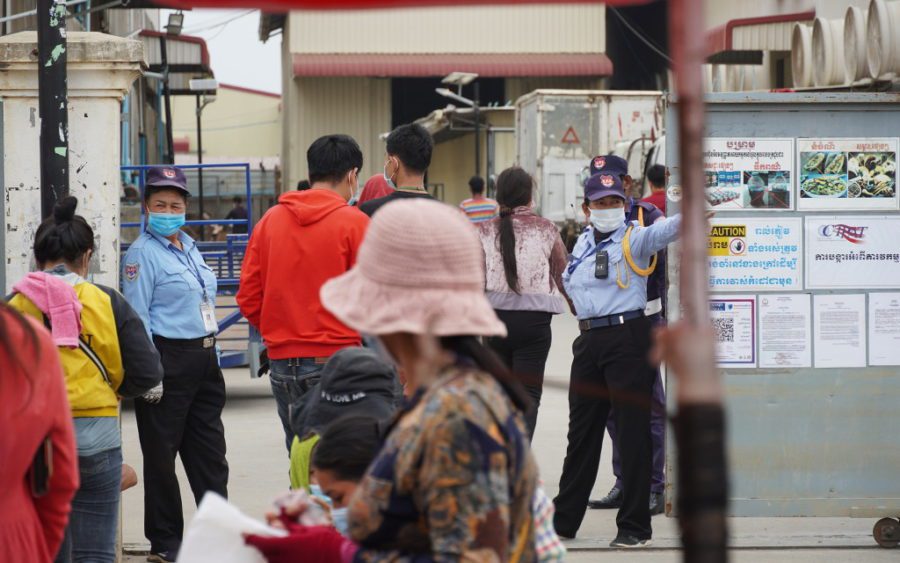Garment factories outside the strictest lockdown zones are looking to reopen with half their workforce and Covid-19 preventions as Phnom Penh eases lockdowns, but the restrictions have still had an impact on cash flow and production for several garment industry players as well as workers.
Prime Minister Hun Sen announced via Facebook on Monday that the lockdown would end outside the most-affected neighborhoods, and on Wednesday the red zones were contracted to the village level, though a large portion of factory-filled Choam Chao I, Choam Chao II, Toul Sangke I and Stung Meanchey III communes remained in red zones.
The Labor Advisory Committee, consisting of representatives from the Garment Manufacturers Association in Cambodia, unions and the Labor Ministry, on Tuesday released suggested measures for factories to reopen at 50 percent capacity, including that a factory’s operations would be suspended if one employee tests positive for Covid-19. Factories would need to split shifts every two weeks, with the first shift involving workers who have had their first or second dose of a vaccine, or workers who live outside areas requiring Covid-19 tests, or those who have a certified test.
The document also asks factories to provide 50 percent of workers’ monthly wages to cover their two-week shifts while maintaining benefits and overtime pay, and sets out measures for operating and cleaning the factories to prevent the spread of the virus. It encourages monthly random Covid-19 testing for 10 percent of the workforce, and helping workers negotiate with their transport providers to provide rubbing alcohol before getting on the back of a truck.
Meas Soksensan, spokesperson for the Finance Ministry, referred VOD’s questions about factory’s ability to pay government and worker obligations to the Labor Ministry. He said the Finance Ministry was “still evaluat[ing]” the economic impact of the lockdown.
After a meeting with Cambodian authorities, the Asean+3 Macroeconomic Research Office, an economic advisory organization, warned that Cambodia would need to provide more support targeted to hard-hit industries and those with high-growth potential in order to make a quick recovery.
“Business closures and job losses due to the pandemic, if prolonged, may diminish the strength of the recovery in coming years and could leave lasting damage to the economy’s productive capacity,” it said.
Larry Ng, executive director of the Hong Kong Business Association of Cambodia, said many factories had either closed or reduced capacity as a result of the lockdown, causing some delays in production.
“Lockdown during the early stage [had] been mixed as some areas are forbidden for traveling and some are ok,” he said in a message. “However, it has been better after one week of lockdown,” noting that those outside Phnom Penh could return to work as usual.
Among the association’s members, some reported reduced cash flow, and some buyers had switched to buying from factories outside of Phnom Penh because of delayed orders and the spread of Covid-19 among workers.
“Some HKBAC members reported financial difficulties, but most are related to cash flow, not because of incurring big losses,” he said.
Quality Textiles, a sleepwear manufacturer in Phnom Penh’s Choam Chao I commune, is “waiting to open,” its manager — who gave his name only as Mr. Chung — said on Tuesday.
Chung said the factory had been closed for weeks now, and the factory could not fulfill orders right now and is concerned about catching up on the delayed orders.
“We cannot see the results, but the impact should be very hard,” he said.
Quality Textiles supplies to the U.S. sleepwear and lingerie company MGT Industries, according to data on supply chain tracker Panjiva.
When asked whether the company’s buyers were understanding of the lockdown situation with their quotas and deadlines, he said: “It’s very hard, [the] buyers only need the goods, so how can the buyer understand the situation?”
Chung said the company had yet to pay workers for the end-of-April pay period, but he was awaiting instructions from the Malaysian-owned company’s director, saying he would also need to negotiate with workers. The company pays workers in cash, he added.
Khun Tharo, coordinator for labor advocacy group Central, said his organization was still trying to collect information on how many workers were being supported by their factories, and whether they were paying partial salaries or in full.
Most factories still pay their workers in cash, creating another health risk for workers who are already crowded into assembly lines, dormitories, the backs of trucks for transport to work, and now vaccine lines.
“If the factories are not well organized [in distributing payments] … it’s a high risk for them as well to have to line up at factories to get cash,” he said.
“I’m sure they will keep delaying and delaying [lockdown restrictions], those in the red zones maybe are not able to get out,” he added.
Chea Sinat Garment, a jeans factory on the Chbar Ampov border to Kandal province, is prepared to reopen on Thursday, said Puthearoth, the son of the factory’s owner.
He told VOD on Tuesday that the factory would reopen with 50 percent capacity, in line with the Labor Ministry’s recommendations. However, in contrast to the guidelines, he said he heard the factory would be allowed to remain open unless 10 or more workers test positive for Covid-19.
The Cambodian-owned factory, which supplies to European and local buyers, had some financial issues because buyers would not pay until an order is complete, so the factory requested support from the government in order to pay workers’ salaries, Puthearoth said. With lesser capacity, Puthearoth said revenues might be slow. But workers need to feel safe or they will not be productive, he said.
“If we open the business [fully], it will not have good productivity because they fear they will get the covid,” he said. Operating at half capacity was “a better way to solve the problem.”













